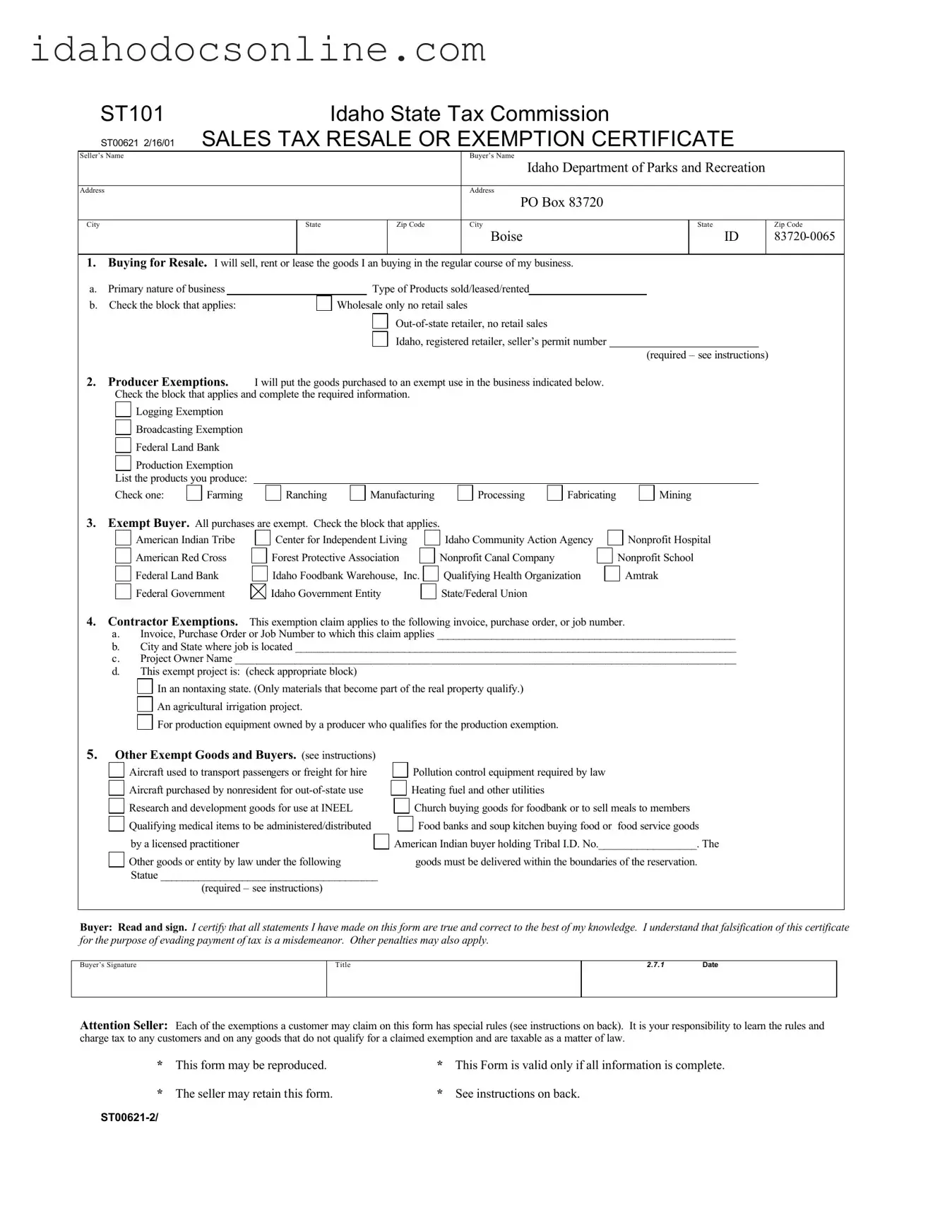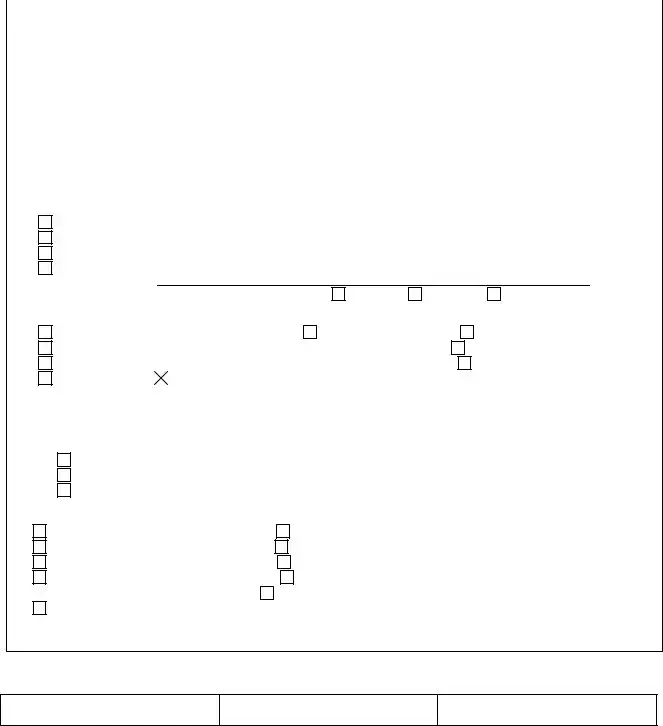|
resale can buy goods that are directly and primarily used in the |
Production Equipment: A contractor who installs production equipment for |
|
production process without paying tax. Loggers, publishers of |
a producer/manufacturer can buy the materials for the production |
|
free newspapers (with at least 10% editorial content) and |
equipment exempt from tax. |
This exemption does not apply to materials |
|
broadcasters are granted a similar |
exemption. However, a |
that become part of real property. |
|
seller must charge these buyers sales tax on any of the |
|
|
|
|
following: |
|
|
5. Other Exempt Goods and Buyers: If a buyer claims an exempt that is |
|
A hand tool with a unit cost of $100 or less |
not listed on this form, he should mark the “other” block and must list |
|
Transportation equipment and supplies |
the section of the law under which he is claiming the exemption or the |
|
Research equipment and supplies |
certificate is not valid. |
|
|
Goods used in selling/distribution |
|
|
|
|
|
Janitorial or cleaning equipment or supplies |
Aircraft Used to Transport Passengers or Freight for Hire: Only aircrafts |
|
Maintenance or repair equipment and supplies |
purchased by an airline, charter service, air ambulance service, or freight |
|
Office equipment and supplies |
|
companies qualify. |
Parts and supplies are taxable. Examples of aircrafts |
|
Any licensed motor vehicle or trailer and parts |
that don’t qualify for this exemption are those used for recreational flights, |
|
Aircraft and parts |
|
aerial spraying, dumping, or logging. |
|
Recreation vehicle |
|
|
|
|
|
Goods that become improvements to real property (such as |
Aircraft Purchased by Nonresidents for Out-of-State Use: An aircraft sold to |
fence posts) |
|
|
a nonresident is exempt if it will be immediately removed from Idaho and |
|
|
|
|
registered in another State, and will not be stored or used in Idaho for more |
NOTE TO SELLER: |
You may stamp or imprint a Producer Exemption |
than 90 days in any 12-month period. Aircraft kits and hang gliders do not |
Claim on the front of your invoice. If a customer fills in his exemption |
qualify for this exemption. |
|
claim on a stamped or imprinted statement each time you make an |
|
|
|
exempt sale to him, you do not have to keep a Form ST-101 on file for |
A business is “nonresidential” if it has no business presence in Idaho. A |
the customer. |
Contact any Tax Commission Office to obtain the |
business with property in Idaho, or employees working here, does not |
required language for the statement. |
|
qualify for this exemption. |
|
3. |
Exempt Buyers: These buyers are exempt from tax on all |
Pollution Control Equipment: |
Equipment required by a State or Federal |
|
purchases. |
|
Agency and “dry to dry transfer systems” used by the Dry Cleaning Industry |
|
|
|
|
qualify. Chemicals and supplies used for pollution control do not qualify. |
Hospitals: Only licensed nonprofit hospitals qualify. Nursing Homes |
Equipment for licensed motor vehicles does not qualify. |
or similar institutions do not. |
|
|
|
|
|
|
|
|
Research and Development at INEEL: Only goods that are directly and |
Schools: Only nonprofit colleges, universities, primary and secondary |
primarily used in research, development, experimental, and testing activities |
schools qualify. |
Schools primarily teaching subjects like business, |
at the Idaho National Engineering and Environmental Laboratory qualify. |
dancing, dramatics, music, cosmetology, writing, and gymnastics do |
Items that become a part of real property do not qualify. |
not |
qualify. |
Auxiliary organizations, such as parent-teacher |
|
|
|
associations and alumni groups, do not qualify. |
Medical Items: Only the following medical goods qualify if they will be |
|
|
|
|
administered or distributed by a licensed practitioner; drugs, oxygen, insulin, |
Centers For Independent Living: Only nonresidential centers run by |
syringes, prosthetic devices, durable medical equipment, dental prosthesis, |
disabled persons that provide the independent living programs to |
orthopedic devices, urinary and colostomy supplies, enteral and parenteral |
people with various disabilities qualify. |
|
feeding equipment and supplies, hemodyalisis and peritoneal dialysis drugs |
|
|
|
|
and supplies, and chemicals and equipment used to test or monitor blood or |
Qualifying Health Organizations: Only these qualify - - |
urine of a diabetic. |
|
|
American Cancer Society |
Idaho Ronald McDonald |
|
|
|
House |
|
|
Heating Fuels: Heating fuels such as wood, coal, petroleum, propane, and |
American Diabetes Association |
Idaho Women’s and |
natural gas are exempt when purchased to heat an enclosed building under |
Children’s |
|
|
construction, or when used for cooking or water heating. |
American Lung Association of Idaho |
Alliance |
|
|
|
American Heart Association |
March of Dimes |
Church: A church may buy food to sell meals to its members or qualifying |
The Arc, Inc. |
|
Mental Health |
goods for its food bank without paying tax. Churches must pay tax on all |
Association |
|
|
other goods they buy to use. |
|
Children’s Home Society of Idaho |
Muscular Dystrophy |
|
|
|
Foundation |
|
|
Food Banks and Soup kitchens: Food banks and soup kitchens may buy |
Arthritis Foundation |
National Multiple |
food or other goods used to grow, store, prepare, or serve the food exempt |
Sclerosis Society |
|
from sales tax. This exemption does not include licensed motor vehicles or |
Easter Seals |
|
Rocky Mountain Kidney |
trailers. |
|
|
Association |
|
|
|
|
|
Idaho Cystic Fibrosis Foundation |
Special Olympics Idaho |
American Indians: |
Sales to an enrolled Indian Tribal Member are exempt if |
Idaho Diabetes Youth Program |
United Cerebral Palsy |
the seller delivers the goods to him within the Reservation boundaries. The |
Idaho Epilepsy League |
|
buyer’s Tribal Identification Number is required. |
Idaho Primary Care Association |
|
|
|
|
and it’s Community Health Centers |
|
Ski Resorts: The owner or operator of a downhill ski area with an aerial |
|
|
|
|
passenger tramway may buy parts, materials and equipment that become a |
Government: Only the Federal government and Idaho State, County |
component part of the tramway and snow grooming and snowmaking |
or City government qualifies. Sales to other States and their political |
equipment for the slope exempt from tax. An aerial tramway includes chair |
subdivisions are taxable. |
|
lifts, gondolas, T-bar and J-bar lifts, platter lifts, rope tows, and similar |
|
|
|
|
devices. |
|
|


